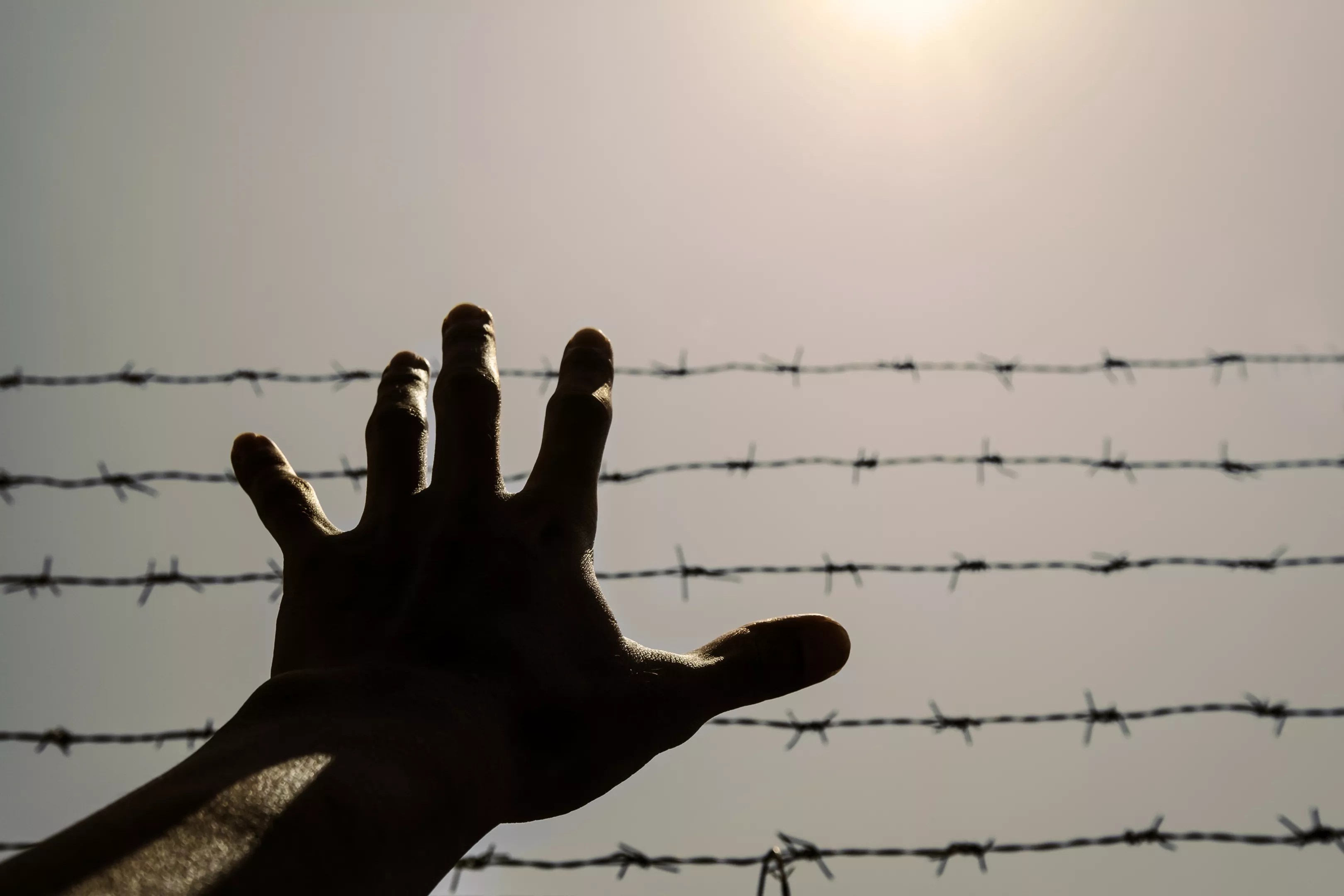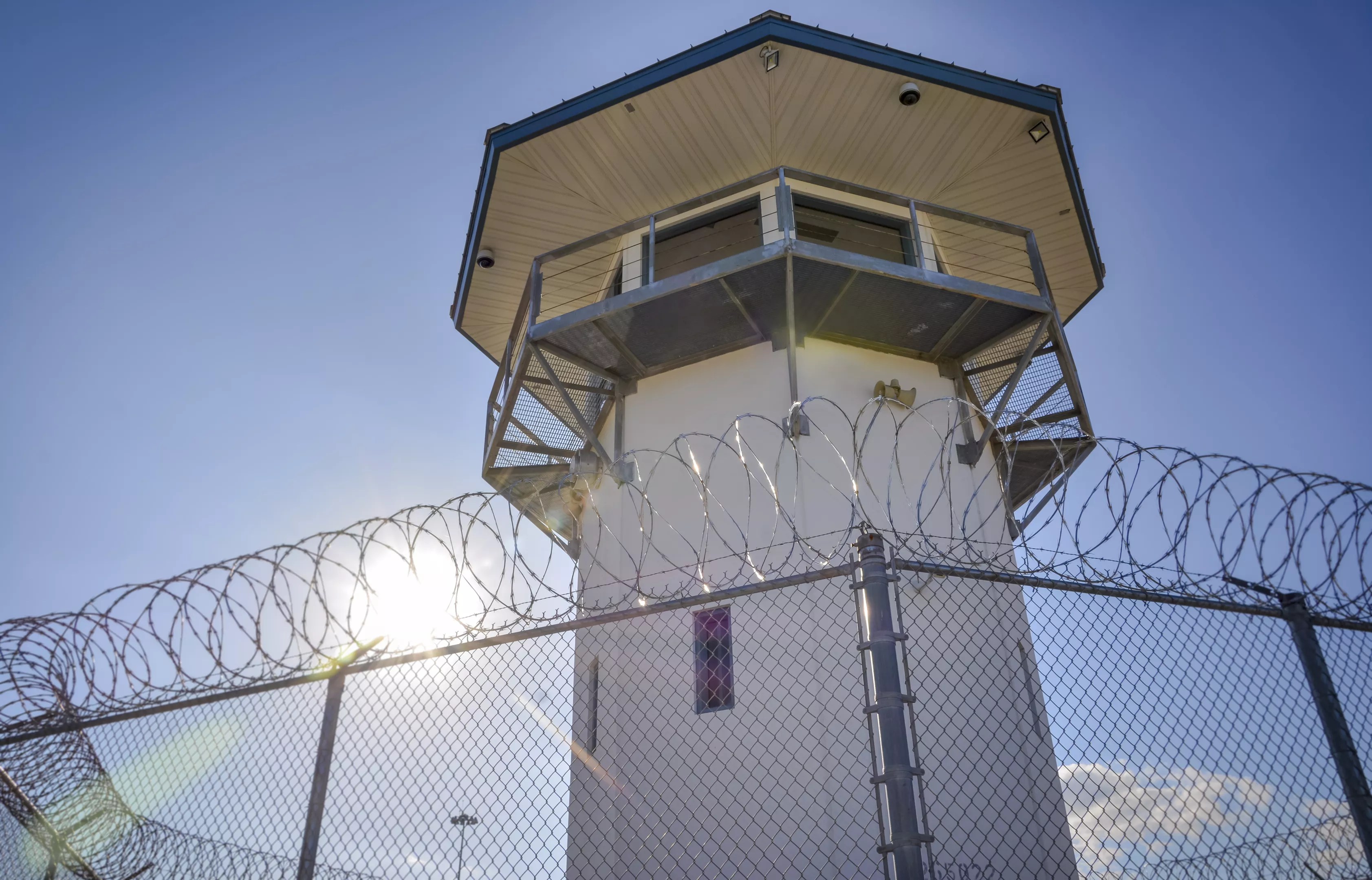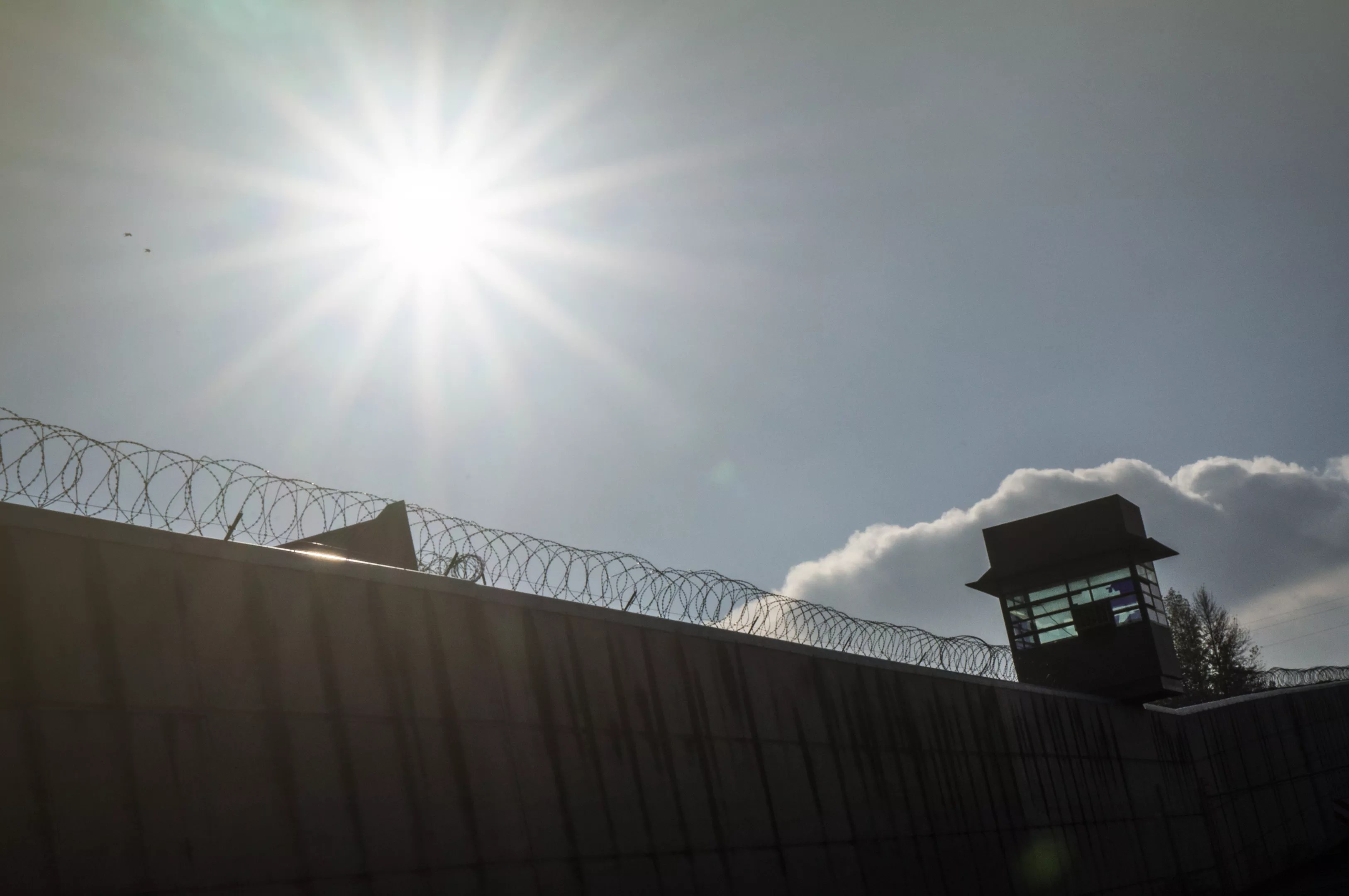
Photo by Sasin Paraksa/Getty Images

Audio By Carbonatix
During Florida’s blistering summer months, Morin C.* says the heat in his prison cell becomes so sticky and oppressive, he sometimes showers seven times a day just to cope.
The 41-year-old is incarcerated at Everglades Correctional Institution (ECI), a men’s state prison located on the edge of the Everglades in west Miami-Dade County that – like most Florida state prisons – lacks universal air conditioning. He suffers from obsessive-compulsive disorder, which he says makes the stifling, mostly air-conditionless environment feel even more stifling during the summer.
Most days, he skips walking to the dining hall for lunch and dinner to avoid the sweltering heat.
“Avoidance has been my way of survival,” Morin says. “Yet there always comes a time when a walk outside is inevitable.”
Despite our summers getting warmer – last year was the hottest on record – most Florida state prison housing units remain devoid of universal air conditioning. That includes ECI’s, which houses more than 1,600 men.
New Times spoke with six men incarcerated at ECI about what it’s like to live through the state’s notoriously hot summers in air-conditionless cells. They described being perpetually drenched in sweat and battling dehydration and other heat-related illnesses. [Editor’s note: *To safeguard their identities, the incarcerated men quoted in this story are identified by their first names.]
As Florida endures another scorching summer, with heat indexes topping 110 degrees in some areas this past July, the men say conditions inside the prison, which has cooling units installed in “certain areas,” according to a Florida Department of Corrections (FDOC) spokesperson, have become increasingly unbearable.
Kemar R.*, 45, who has spent 15 years behind bars, says he attempts to cool down by wearing minimal clothing. Others say they’ve tried putting a bag over the window to channel airflow while they sleep.
But for many, relief is fleeting.
“I know from personal experience that inmates survive the brutal heat differently,” Kemar says. “But how we’re going to survive the next heatwave or the increasing temperatures in the years to come is going to be a question of humanity.”

Prisoners at Everglades Correctional Institution describe what it’s like to live through the state’s notoriously hot summers without air-conditioning.
Photo by the Florida Department of Corrections (FDOC)
Cooling Plans Stalled
Air conditioning is the single most effective method for keeping indoor temperatures safe. Still, most prisons, including many in the hottest states across the South, including Florida, aren’t fully air-conditioned.
A recent Reuters investigation found that nearly half of state prisons across 29 U.S. states have “partial or no air conditioning in housing units.” A 2022 USA Today review of state prison systems found that 44 states lack universal air conditioning. By comparison, nearly 90 percent of U.S. homes use it.
Most Florida prisons were built decades ago, long before AC was commonplace. Only 25 percent of prison housing units have AC, with most units set aside for vulnerable groups like the sick, mentally ill, pregnant, and elderly, the FDOC reports.
The lack of air conditioning is just one of the major challenges confronting the FDOC – and one of the issues prison-reform advocates have long sought to address.
In 2020, after Denise Rock, executive director of the inmate-advocacy group Florida Cares, lobbied then-FDOC secretary Julie Jones to stock cooling towels and personal fans for prisoners, the corrections department began selling the towels and moisture-wicking shirts at the canteen, where prisoners buy snacks, personal hygiene items, and other items.
And in 2022, following several years of pressure from prison-reform advocate Connie Edson, the state began testing a portable AC unit at Lowell Correctional Institution, the state’s largest women’s prison in Ocala. The long-term pilot program deployed “portable evaporative air coolers,” a low-cost alternative to the refrigerant-based air conditioning used in traditional window-mounted and central AC systems.
However, the program came to an end after FDOC Secretary Ricky Dixon appeared to dismiss the coolers as a long-term solution. “These portable units and some band-aid approaches we’ve tried…. Even the [inmate] population doesn’t like them,” Dixon reportedly told a legislative committee in fall 2023, referencing the noise and moisture they create.
Since then, efforts to bring more air conditioning into the state’s prisons have mostly stalled.
In 2023, the state hired consulting firm KPMG to craft a 20-year master plan for the prison system. The firm’s 134-page report broke down immediate maintenance needs and found that more than one-third of state prison facilities were in “critical” or “poor” condition, and that most FDOC dormitories required retrofitting to comply with current ventilation standards. The report estimated that bringing Florida prisons up to date with heating, ventilation, and air-conditioning (HVAC) systems, window replacements, and electrical upgrades would cost $582 million.
In 2024, Gov. Ron DeSantis approved $100 million a year for 30 years to fix the troubled prison system – a small fraction of the more than $3 billion immediately needed.
Earlier this year, Edson partnered with Horizon Communities Corp., a nonprofit that runs faith-based programming inside Florida prisons, to seek funding in the state budget for a pilot program to install AC in correctional institutions where Horizon runs its faith-based programs, including ECI. But while lawmakers in the House and Senate earmarked $300,000 for the initiative in the 2025-26 state budget, DeSantis vetoed the funding in late June as part of a $567 million budget cut.
“I’m floored. I can’t believe he turned it down,” Edson, who has spent half a decade working on the issue, told Florida Politics in July. “We’re talking about what’s humane and what’s inhumane, and this is the most inhumane thing ever.”
DeSantis’ office did not respond to New Times‘ request for comment.

A report estimated it would cost 2 million to modernize Florida prisons with heating, ventilation, and air-conditioning systems (HVAC), window replacements, and electrical upgrades.
Photo by Antonio Garcia Recena/Getty Images
Deadly Heat
One sweltering summer day, while working on the roof at ECI, Jack B.* says he grew lightheaded and nauseated. Soon after, he began vomiting and dry heaving – episodes that persisted for about 45 minutes.
At 57 years old, he says his body no longer handles the heat like it once did. The relentless temperatures leave him constantly drained, both mentally and physically.
“It’s as if my brain is going into protective mode and shutting down certain brain functions or capabilities in order to preserve [its] health,” he says. “I struggle to get motivated to complete the simplest task because my brain isn’t functioning at its peak capacity.”
He says the heat feels impossible to escape in the concrete prison. “Even as we speak, sweat is both running down my back and dripping in my lap,” Jack says. “It’s as if every word that I speak has its own bead of sweat.”
Thanks to climate change, heat waves and days with temperatures above 100 degrees Fahrenheit are becoming more frequent. This can be especially dangerous for people behind bars: When outdoor temperatures exceed 100 degrees outside, studies have shown that heat indexes in some prisons and jails can reach 150 degrees because the buildings tend to trap heat.
In an email to New Times, an FDOC spokesperson said that in housing units without air conditioning, like those at ECI, “various climate control measures are used to reduce heat, including industrial fans, exhaust systems that promote high air exchange, and ceiling or wall-mounted circulation fans.”
“In addition, all housing units contain refrigerated water fountains to provide a source of cool water for the inmate population,” the spokesperson wrote, adding that prison staff members are trained to recognize signs of heat-related illness and respond as necessary.
“Advisories and informational materials are distributed to ensure that staff can recognize the symptoms of heat stroke and heat exhaustion and provide treatment,” they wrote. “Medical staff provides instruction during the initial reception process and during each institutional orientation to educate inmates on ways to prevent heat-related illness.”
Extreme heat is dangerous for a handful of reasons. Not only can it impair cognitive function, but it’s also been found to potentially exacerbate violent outbreaks. A 2021 study of Mississippi correctional facilities found that, on days when the average temperature reached or exceeded 80 degrees Fahrenheit, the rate of violent interactions increased by 20 percent.
The effects of extreme heat in prisons can also be deadly.
“[Every] one-degree increase above 85 degrees Fahrenheit in prisons without air conditioning was associated with a 0.7 percent increase in the risk of daily mortality,” according to a Brown University study of heat-related mortality in Texas prisons between 2001 and 2019.
Because the FDOC doesn’t report heat-related illnesses or deaths as part of its inmate health and mortality data, it remains unclear how many people have died of heat-related illnesses in Florida prisons.

When it’s hotter than 100 degrees outside, studies have shown that heat indexes in some prisons and jails can reach 150 degrees, since the buildings often trap heat.
Photo by Jeremy/Flickr
Legal Efforts
In late 2024, the civil rights group Florida Justice Institute (FJI) filed a lawsuit against the FDOC on behalf of people incarcerated at Dade Correctional Institution, a state prison in Homestead, alleging that the extreme heat contributed to the deaths of four prisoners and the illness of several others at the aging facility.
The suit – which alleges the state has “knowingly” subjected incarcerated people to “unbearable heat” and has failed to take “meaningful action” to protect prisoners from the heat – asks that the extreme heat be ruled as unconstitutional under the Eighth Amendment and that the FDOC take mitigation measures, including installing air conditioning.
“The dormitories lack air conditioning, and to the extent they ever had functional ventilation systems, those systems have
fallen into abysmal disrepair. As a result, the hot air is stagnant, fetid, and contaminated with rust, bacteria, and mold,” the lawsuit reads. “These conditions cause people incarcerated at Dade CI to suffer, fall ill, and die, while the FDC ignores their pleas for relief.”
The lawsuit details several instances of death and illness among the population that they attribute to the prison’s extreme temperatures, but notes that the FDOC only classifies fatalities in four broad categories: “homicide,” “suicide,” “accident,” and “natural” – and deaths by heat stroke are typically classified as “natural.”
For instance, in September 2021, a 72-year-old man identified only as J.W. collapsed while walking to the infirmary and later died, according to the lawsuit. The suit claims that the heat index that day was 92.2 degrees Fahrenheit, within the “Extreme Caution” range for healthy individuals.
But while J.W. suffered from asthma, hypertension, chronic obstructive pulmonary disease, and heart disease, and his official cause of death was listed as “hypertensive and atherosclerotic cardiovascular disease,” FDOC deemed his death “natural,” according to the lawsuit.
“It is likely that prolonged exposure to Dade CI’s heat was a contributory cause of his death,” the lawsuit alleges.
In May, U.S. District Judge Kathleen Williams rejected FDOC’s request to dismiss the suit. The case is in the discovery phase, with a trial set for July 2026.
This story would not have been possible without reporting contributions from Anthony Cobb, a journalist incarcerated at Everglades Correctional Institution (ECI) in Miami who conducted the interviews with the ECI prisoners quoted in the article. Cobb reports on prison reform and has written for Prism, Scalawag Magazine, and the Prison Journalism Project.